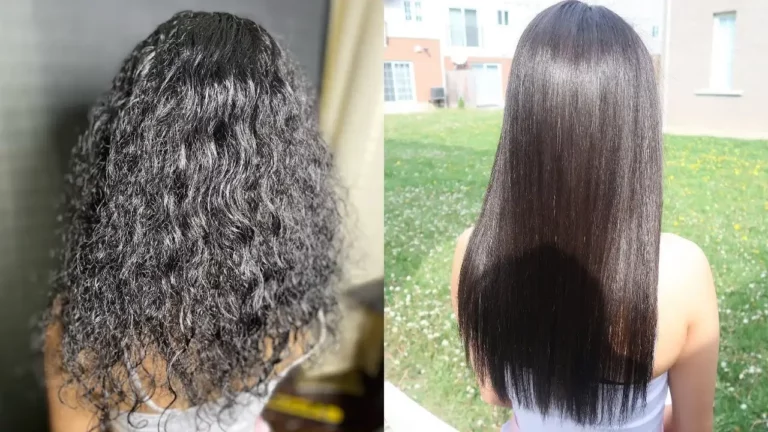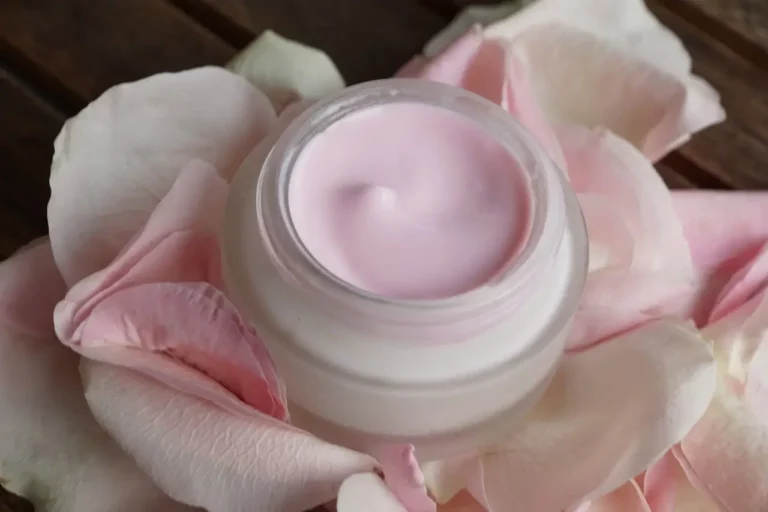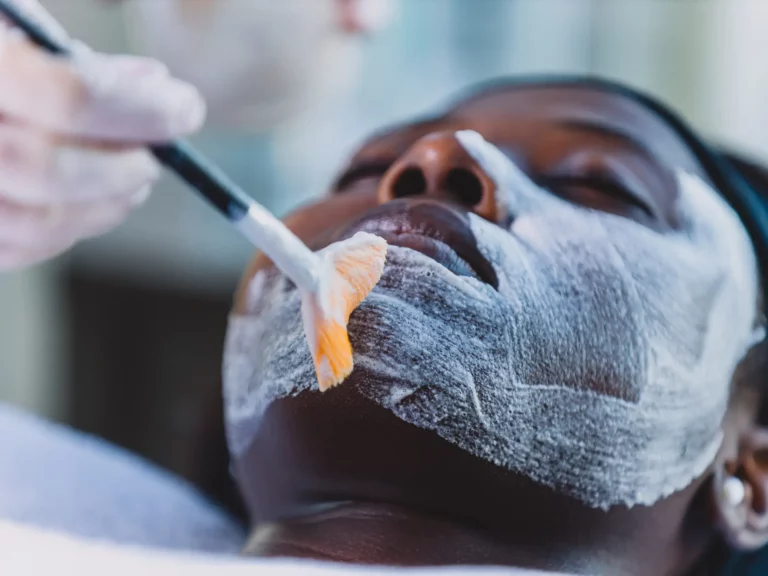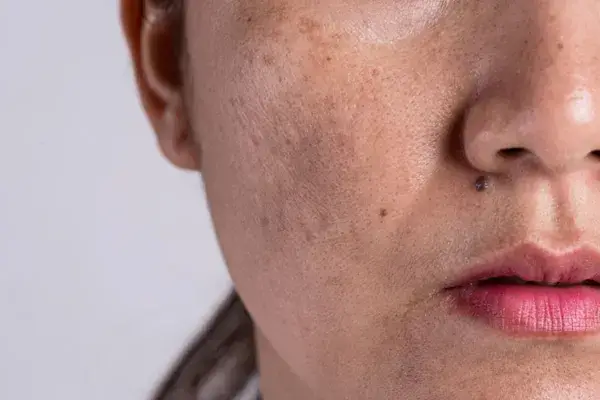10 best Oil for hyperpigmentation: How they work, how to use them, risks and side effects
In recent years, skin pigmentation has become a widespread issue. Skin becomes discolored and sometimes develops black spots on particular areas of the face or body.
It is a frequent skin disorder that affects both men and women and is primarily brought on by sun exposure, hormone changes, aging, acne, and medications, among other things. These are also referred to as age spots, freckles, and melasma.
On your skin, essential oils can work miracles. They can aid in the treatment or prevention of skin conditions like hyperpigmentation.
In this blog post, we’ll discuss the top essential oils for hyperpigmentation, how they work, how they are used to clear hyperpigmentation, the risks or side effects related if not appropriately used, and their incredible health benefits.
Table of Contents
What are Essential oils?
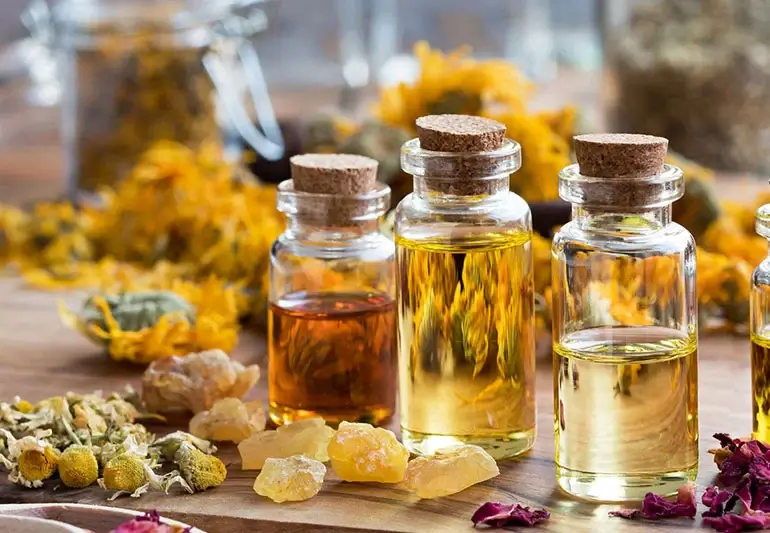
Essential oils are liquid compounds extracted from plants through mechanical pressing or distillation, retaining their source’s characteristics, natural smell, and flavor.
These oils are highly concentrated with active ingredients, which often have a more pungent smell than their parent source.
Essential oils are extracted from plant parts like leaves, roots, and others. Due to their high antioxidant content, these essential oils nourish skin cells by repairing and curing damage.
In addition to aiding in treating hormonal imbalances and enhancing circulation, the essence of these potent compounds also aids in the fading of hyperpigmentation and increases skin cell renewal.
Topical application is the most efficient way to get skin-beneficial antioxidants to our cells’ outermost layer.
You may like to check out The Power of Glass Skin Facial Treatment for a Glowing Skin.
What are the Best Essential Oils for Hyperpigmentation
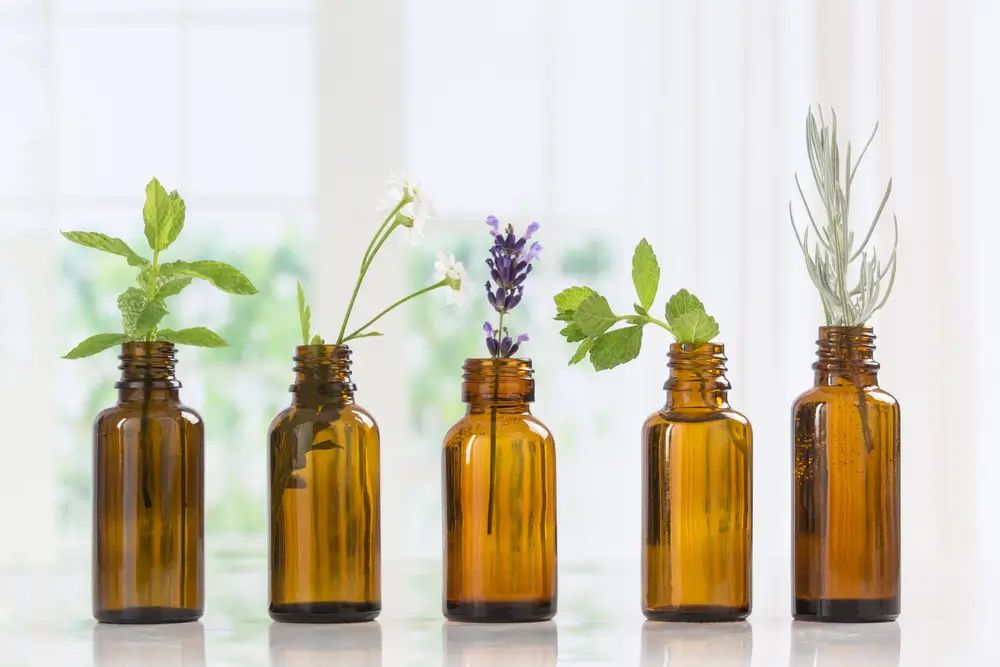
Hyperpigmentation can be seen as those areas of the skin surrounded by dark patches. These dark patches, also seen as dark spots or the aftermath of acne, are fully explained in what hyperpigmentation is. Essential oils have been evident in getting rid of hyperpigmentation.
The greatest essential oils for hyperpigmentation will be covered in this article, along with how these all-natural remedies for skin discoloration work to get rid of dark patches.
These oils do not include the toxic chemicals found in synthetic products, making them an all-natural approach to curing and preventing the darkening and dulling of your skin.
We’ll discuss numerous natural oils for hyperpigmentation and black spots. They nourish the skin, promote cell growth, and maintain hormone balance. Pure essential oils work wonders on skin tone, texture, and whitening while minimizing discoloration.
Here are the best Essentials oils for hyperpigmentation
#1. Carrot seed oil
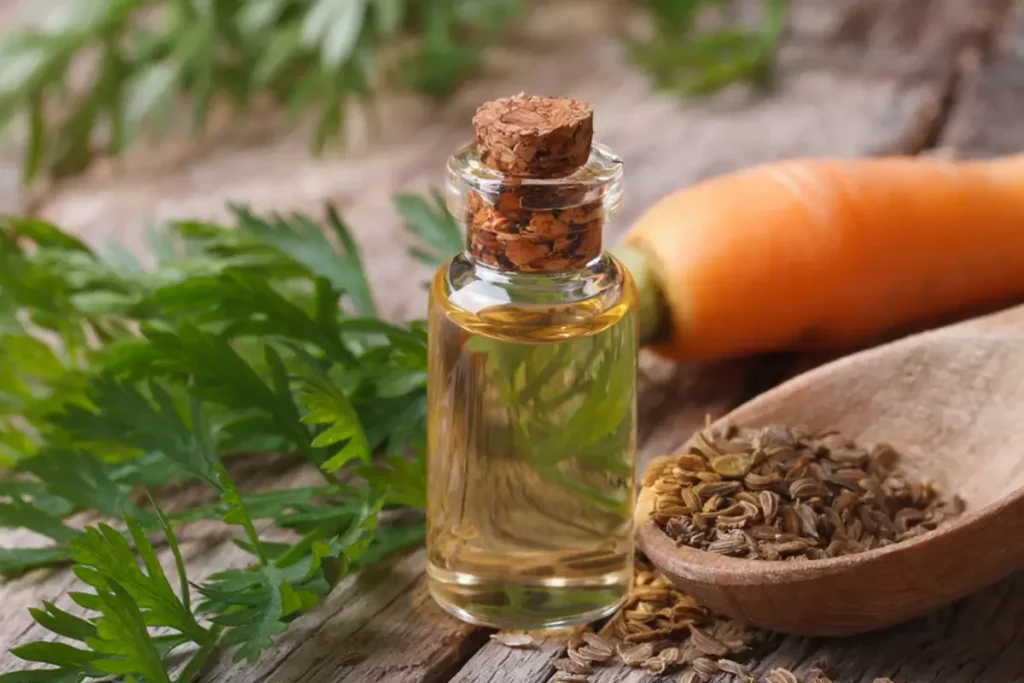
Carrots seed oil is a highly beneficial essential oil from carrot seed, not the carrot we consume.
It contains a variety of skin Nourishing compounds that support skin renewal. One of the known compounds is umbelliferone, or 7-hydroxycoumarin, used in sunscreen due to its UVB absorbance.
Beta-carotene and other antioxidants found in carrot seed oil, a unique component with anti-inflammatory qualities, are abundant. This essential oil aids in melasma-related skin pigmentation removal or hyperpigmentation reduction.
The UVB concentration of carrot seed oil is an additional intriguing quality that helps to shield the skin from the damaging effects of sunshine.
#2. Tea tree oil
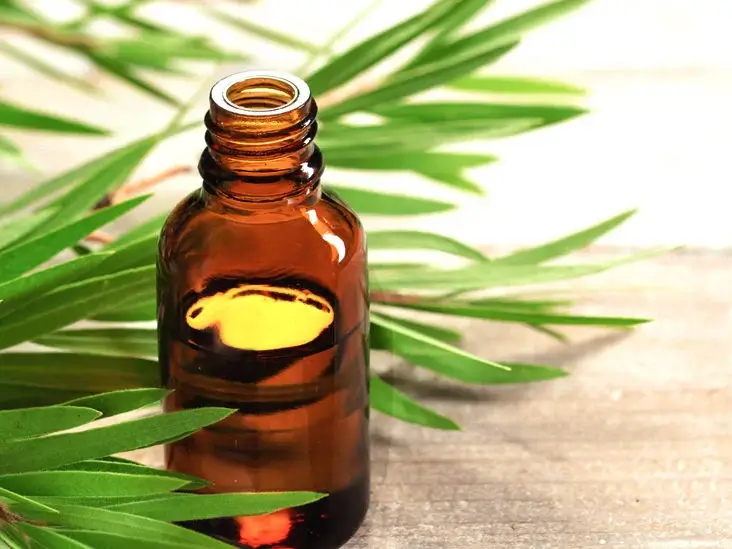
Tea tree oil is evident in treating skin inflammation and other skin troubles, including hyperpigmentation. It is obtained from the leaves of Australian Melaleuca alternifolia trees.
Tea tree oil is effective in treating post-inflammatory hyperpigmentation. It aids those susceptible to dark spots and acne scars, which are brought on by repeated harm to the dermal matrix and the accumulation of melanin pigment.
Given that it works well on all skin types, including sensitive and oily skin, it is one of the best essential oils for getting rid of hyperpigmentation. The antibacterial and antiseptic properties of this oil promote skin healing.
#3. Lemon oil

Lemon oil is an all-natural ingredient that serves as a home health remedy. This oil is obtained through steam extraction or cold pressing of fresh lemon peel. It can be diluted and applied on the skin to eliminate hyperpigmentation and other skin irritations or diffused into the air and inhaled.
Lemon oil is one of the best essential oils for treating dark spots and hyperpigmentation on the face due to its high vitamin C content. As a result, it is a very effective source of antioxidants.
Additionally, it functions as a bleaching agent, which means that it aids in lowering the production of melanocytes, which causes dark spots and patches to lighten over time. It has limonene, which helps this oil brighten and gloss the skin while removing discoloration.
Lemon oil possesses other benefits for health, which were also proven; they may reduce depression and anxiety symptoms, ease morning sickness symptoms, can act as pain relief, make skin looks healthier, and makes you feel relaxed and concentrated, among others not mentioned.
#4. Evening primrose oil
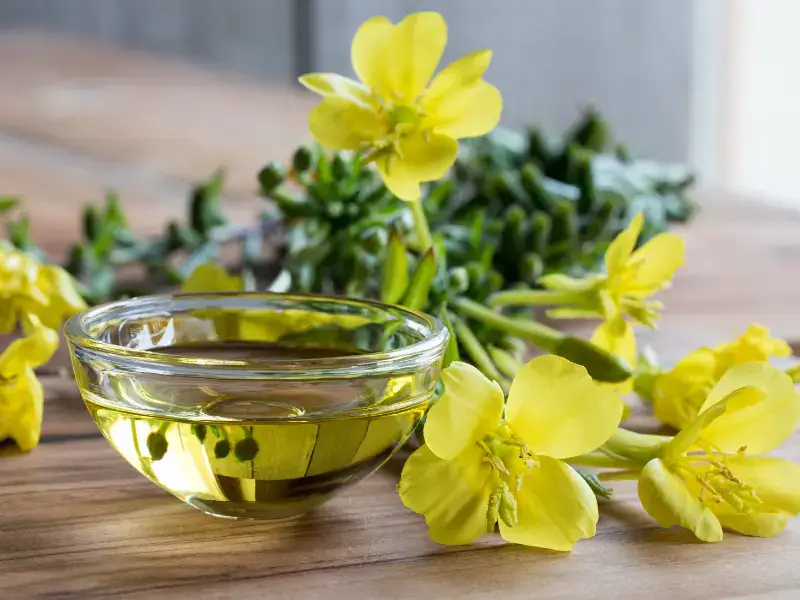
Evening primrose is a flowering plant native to North America and South America. This flower is called Oenothera biennis; the oils are extracted from the seeds.
Evening primrose oil has been evident in treating inflammation, pain, and menopausal symptoms, although recent research does not support its consumption. The oil contains linoleic acid, gamma-linolenic acid (GLA), and other omega-6 fatty acids.
It has excellent anti-inflammatory and hydrating qualities, which aids in retaining moisture and keeps the skin moisturized and silky. Evening primrose oil provides nutrients and good fats that work to hydrate skin and support a uniform skin texture.
The oil’s antioxidants combat the harm-causing free radicals to rejuvenate and heal aging and damaged skin. Along with other skin irritations and inflammations, it also aids in reducing redness, itching, swelling, and other symptoms.
Evening primrose oil assists in eradicating acne and other hormonally-related skin and hair issues while also restoring the delicate balance of the endocrine system, which is extremely sensitive.
Additionally, it lessens hyperpigmentation, which lightens the skin’s dark scars and patches. Evening primrose oil’s toning benefits even out skin tone and lessen hyperpigmentation. So, if hormonal imbalance is the cause of your hyperpigmentation, this oil is for you.
#5. Frankincense oil
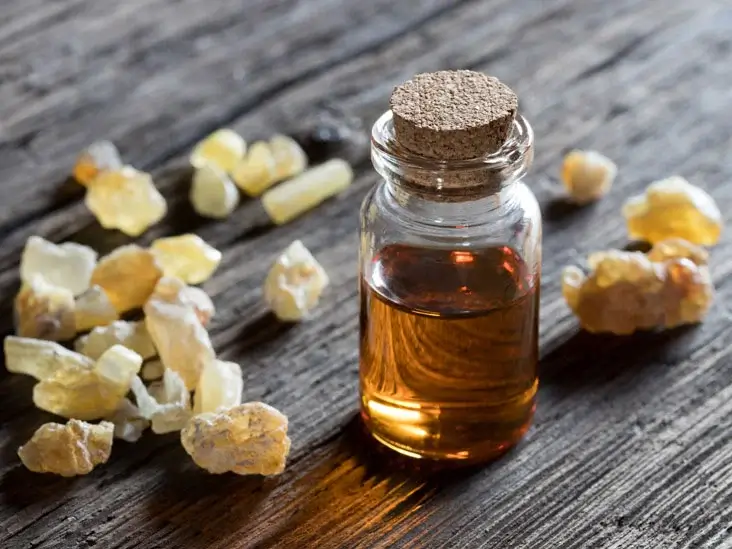
Frankincense oil is an all-natural moisturizer made from the resin of the Boswellia tree, also known as olibanum. These trees are primarily grown in the dry, hilly regions of India, Africa, and the Middle East.
It reduces the appearance of fine lines and wrinkles by rubbing on its scar-erasing properties, which encourage skin cell turnover and increase the suppleness of skin cells.
It supports healthy, vibrant skin without unpleasant roughness because of its cellular regeneration capabilities. Combine this oil with virgin coconut oil to enjoy the benefits.
Frankincense oil has a woody, spicy scent and can be ingested as a supplement, absorbed through the skin, or inhaled.
Frankincense is a substance used in traditional Ayurvedic medicine linked to several positive health effects, including reduced asthma symptoms and improved digestion and arthritis.
#6. Sandalwood Oil
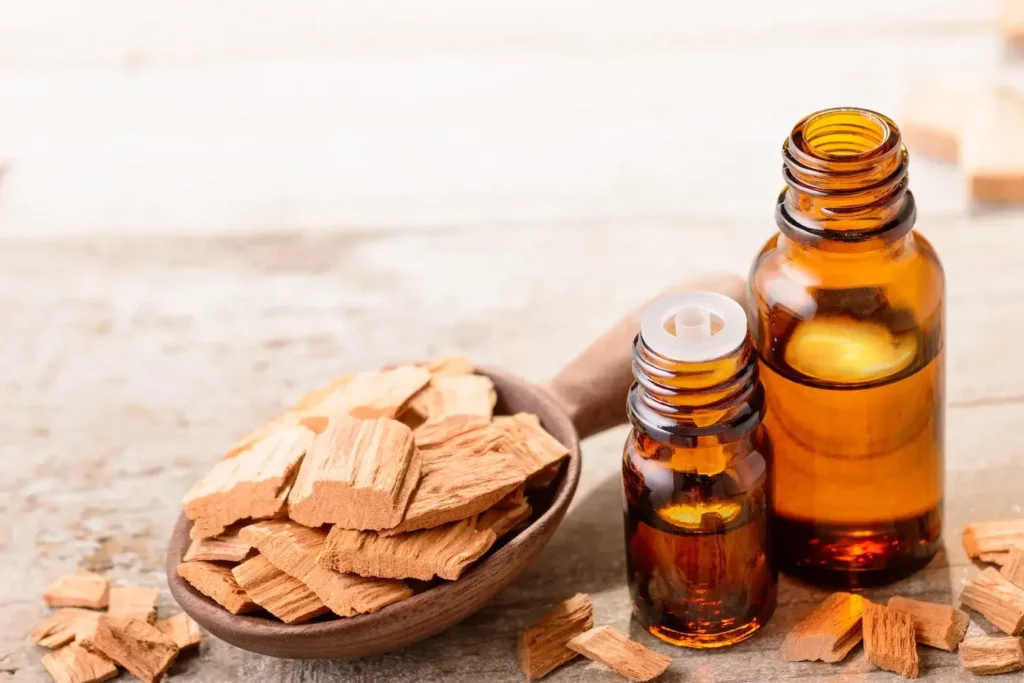
Sandalwood oil is extracted from the wood and roots of the Santalum album, often known as the East Indian sandalwood tree. This oil dates back to when it was employed to treat numerous ailments; this made it a priceless tree.
Sandalwood oil had a lovely scent, which made it a preferred ingredient in many perfumes and aromatherapy products. Aromatic oils are employed in aromatherapy to advance mental and physical health outcomes.
Due to its potent antibacterial characteristics, which prevent hyperpigmentation, eczema, blisters, and allergies, sandalwood oil is utilized in various natural cosmetics. Since sandalwood oil prevents tyrosinase from being produced, it has long been used in Indian skincare.
Additionally, it functions as an antimicrobial to cure skin conditions. Its antibacterial and anti-inflammatory properties make it an excellent oil for eradicating pigmentation and dark spot issues.
According to research, sandalwood may, for instance, benefit from anti-inflammatory, regulate anxiety, promote wound healing, prevent skin cancer, and combat germs.
#7. Geranium oil
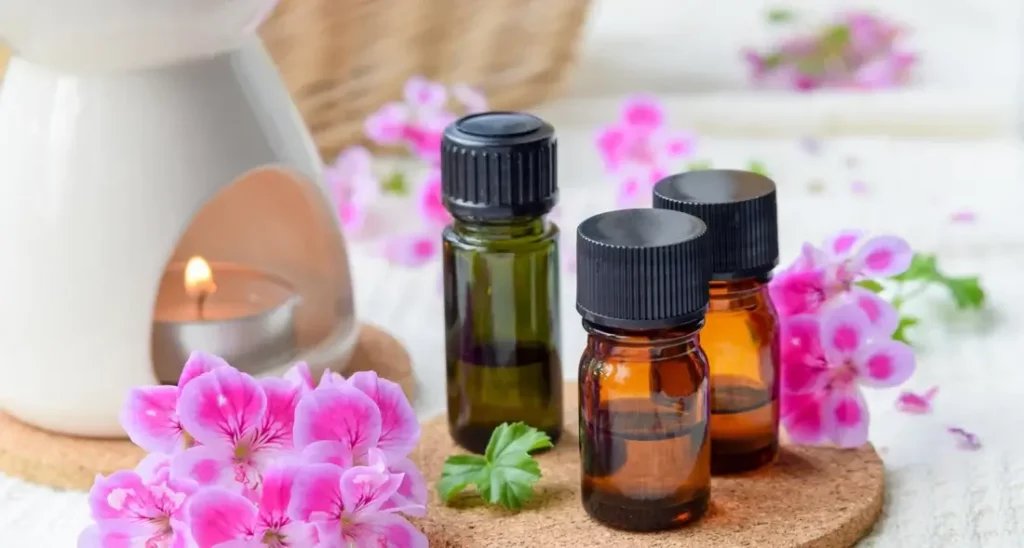
Are you prepared to remove those bothersome scars from acne or dark spots? Why not use geranium oil for body blemishes? It is a natural astringent that may effectively tighten and calm the skin.
Because it is a natural anti-inflammatory and antioxidant, geranium oil is also known for healing damaged skin. This may cause hyperpigmentation or scarring on your skin to eventually fade or heal.
#8. Rose oil
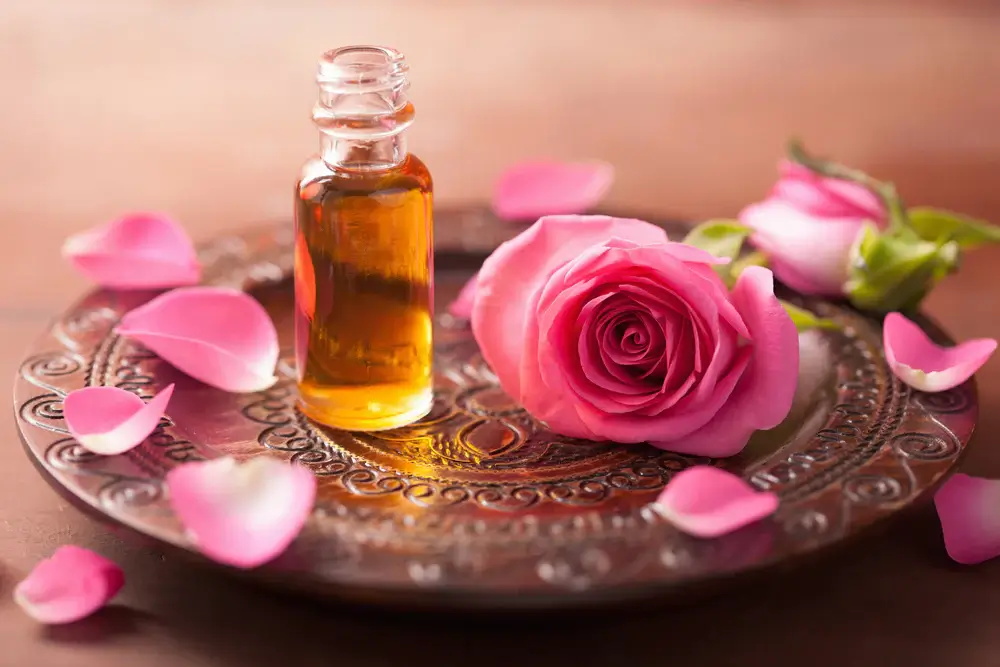
Rose oil is obtained from rose petals, and it takes tons of petals to get even 1kg of pure rose oil; this makes it precious. This oil has many skin benefits, including anti-bacterial, anti-inflammatory, antioxidants, etc., when incorporated into your skincare.
Rose oil contains citral, carvone, eugenol, and nerol, among other compounds that help nourish skin, fight wrinkles, balance hormone production, improve skin blood circulation, and fight skin irritations.
Rose oil, with its skin benefits, can be used to lighten hyperpigmentation on the face, improves skin tone, and brighten the complexion. It also helps in reducing blemishes, acne scars, and black spots.
#9. Rosehip seed oil
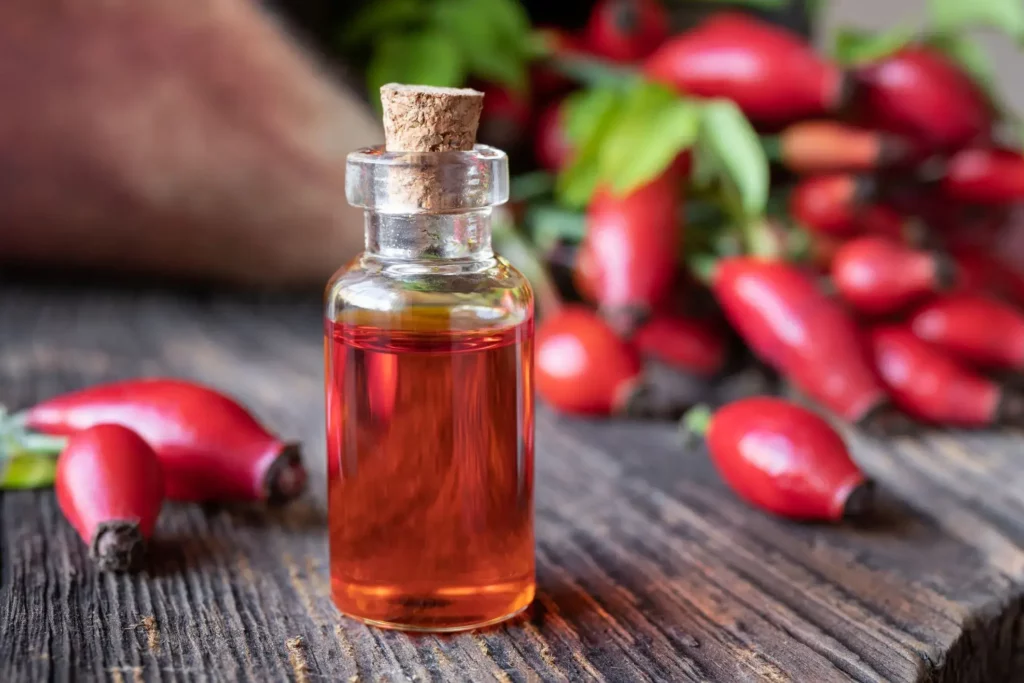
Rosehip seed oil is extracted from organic rosehip seeds. It is a nutrient-rich substance for skin care.
The oil is a terrific source of nourishment for your skin and has a long history of use in the cosmetics industry. Rosehips are a great source of vital fatty acids, vitamins A and C, and other antioxidants that support healthy skin.
While organic rosehip oil has many benefits for your skin, most people use it to clear up and brighten their faces. Post-inflammatory hyperpigmentation (PIH) is also lessened by it.
Rosehip seed oil helps reduce hyperpigmentation, repair sun damage, provide anti-aging benefits, and prevent dryness.
Acne-prone skin can utilize this oil as facial oil because it’s lightweight and absorbs quickly into the skin.
#10. Lavender oil
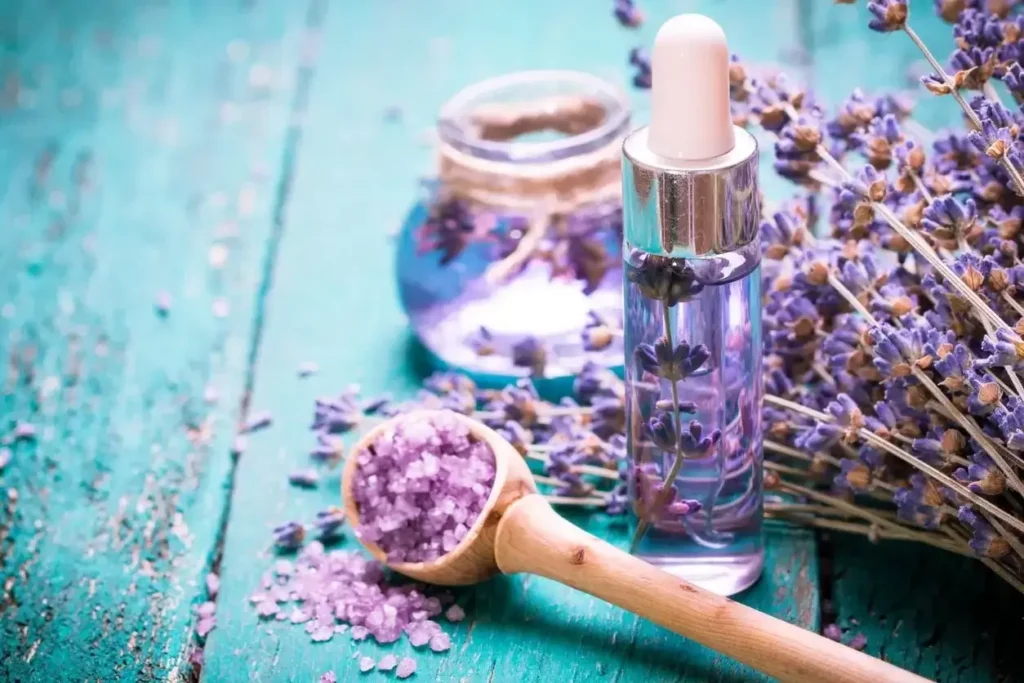
You can use lavender essential oil to eliminate pigmentation, redness, or blotchiness on your skin. Due to its powerful antibacterial and antiseptic properties, which help to rejuvenate skin tone by removing dead cells, it is a very well-liked essential oil for hyperpigmentation.
It also provides calming properties that improve your sleep quality and make your environment less stressful.
In addition, certain additional oils are believed to help lessen dark spots and hyperpigmentation.
Neroli essential oil, turmeric essential oil, clary sage essential oil, chamomile oil, vitamin E oil, papaya seed oil, crane’s-bill, and rosemary essential oil are some of the best essential oils for black spots.
How does Essential Oil work for Hyperpigmentation?
Because they inhibit the production of tyrosinase, an enzyme needed for the development of melanin, essential oils are regarded as natural oils for hyperpigmentation. This enzyme is a natural defense against skin pigmentation since it is UV-sensitive.
Pure essential oils encourage your body to develop new, healthy cells while removing dead tissue, which can assist in minimizing darkening brought on by melanin overproduction quickly.
The skin is also given anti-inflammatory properties derived from natural sources. As a result, acne can be treated, along with any associated hyperpigmentation.
How to use these essential oils for Hyperpigmentation
For the best result for hyperpigmentation, you must understand how to use these essential oils to avoid irritations. Firstly, Select high-quality oils with no synthetics or chemicals and solely aromatic plant ingredients for optimal effects.
Before using essential oils on the skin, they must always be diluted; mix two drops of essential oil with one tablespoon of carrier oil. The most familiar carrier oils include Argan oil and jojoba oil.
To use:
- Cleanse your face properly and pat dry, leaving behind moisture to help lock in the oils.
- Apply your already diluted essential oil and massage through this skin. This should be done in the morning and evening for the best result.
- Remember, path your skin dry, not srub dry!
Risks and Negative Impacts
For safe topical application, essential oils must be diluted with a carrier oil due to their high chemical content. Improper use can cause headaches, contact dermatitis, and irritability. These oils shouldn’t be used over the eyes because they can be poisonous if ingested.
Since the safety of using essential oils during pregnancy or breastfeeding has not yet been determined, it is not advised. Only apply specific essential oils in the evening, such as lemon oil, as they make the skin more sensitive to sunlight.
Apply an essential oil (diluted) to a tiny skin patch and wait 24 hours to see if your skin can tolerate it. It is safe for you to use the oil if there is no reaction.
Before You Go…
Essential oils have been proven to solve skin-related issues such as hyperpigmentation, acne, etc. These essential oils are highly concentrated with active ingredients and should be properly diluted before use or application for the best result.
Always remember to Glow right!

